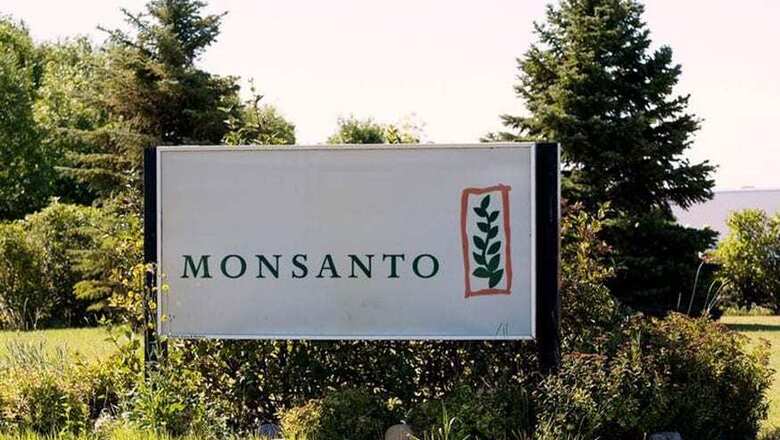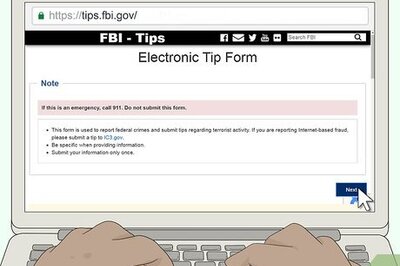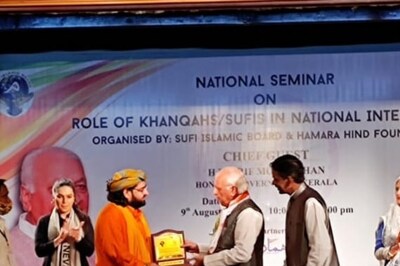
views
Berlin: Monsanto's German owners insisted Saturday that the weed killer Roundup was "safe," rejecting a California jury's decision to order the chemical giant to pay nearly $290 million for failing to warn a dying groundskeeper that the product might cause cancer.
While observers predicted thousands of potential future claims against the company in the wake of Monsanto's defeat, Bayer -- which recently acquired the US giant -- said the California ruling went against scientific evidence.
"On the basis of scientific conclusions, the views of worldwide regulatory authorities and the decades-long practical experience with glyphosate use, Bayer is convinced that glyphosate is safe and does not cause cancer," the company said in a statement.
It said other court proceedings with other juries might "arrive at different conclusions" than the jury which ruled in the California lawsuit, the first to accuse glyphosate of causing cancer.
Jurors unanimously found that Monsanto -- which vowed to appeal -- acted with "malice" and that its weed killers Roundup and the professional grade version RangerPro contributed "substantially" to Dewayne Johnson's terminal illness.
Johnson, diagnosed in 2014 with non-Hodgkin's lymphoma -- a cancer that affects white blood cells -- says he repeatedly used a professional form of Roundup while working at a school in Benicia, California.
"The cause is way bigger than me. Hopefully this thing will get the attention it needs," Johnson, 46, said after the verdict.
Johnson wept openly, as did some jurors, when he met with the panel later.
The lawsuit built on 2015 findings by the International Agency for Research on Cancer, part of the UN World Health Organization, which classified Roundup's main ingredient glyphosate as a probable carcinogen, causing the state of California to follow suit.
"We are sympathetic to Mr Johnson and his family," Monsanto said in a statement, but promised to "continue to vigorously defend this product".
"The jury got it wrong," Monsanto vice president Scott Partridge told reporters.
But Johnson's attorney Brent Wisner said the verdict "shows the evidence is overwhelming" that the product poses danger.
"When you are right, it is really easy to win," he said.
More to come?
Wisner called the ruling the "tip of the spear" of litigation likely to come.
"The jury sent a message to the Monsanto boardroom that they have to change the way they do business," said Robert F. Kennedy Jr -- an environmental lawyer, son of the late US senator and a member of Johnson's legal team.
"You not only see many people injured, you see the corruption of public officials, the capture of agencies that are supposed to protect us from pollution and the falsification of science," he said.
Carl Tobias, a law professor at the University of Richmond in the US state of Virginia, said the plaintiff's evidence that Monsanto "knew or should have known that Roundup caused his cancer" could benefit those currently seeking damages from Monsanto, as well as encourage new filings.
Tobias said Monsanto's promised appeal could result in the charges being reduced -- but said the company "might want to consider settling now, depending on its calculus of the risk that it might lose on appeal and the adverse publicity that might arise from losing or from continuing to contest the verdict."
But he cautioned that settling now could "make it appear that Monsanto believes it has a weak case."
Partridge, meanwhile, announced that Monsanto had no intention of settling the slew of similar cases in the legal queue.
"It is the most widely used and most widely studied herbicide in the world," Partridge said.
'Win for all of humanity'
Roundup is Monsanto's leading product.
"The Johnson vs Monsanto verdict is a win for all of humanity and all life on earth," said Zen Honeycutt, founding executive director of non-profit group Moms Across America.
In France, a leading anti-Monsanto campaigner told AFP that the California ruling would strengthen the resolve of those doing battle with the agrochemicals giant across the world.
"I was thinking of them and I said to myself that this ruling will help them and give them lots of hope," said Paul Francois, author of "A farmer against Monsanto" ("Un paysan contre Monsanto").
France's minister for ecological transition, Brune Poirson, hailed the "historic decision," tweeting that it validated President Emmanuel Macron's push to ban glyphosate use within three years.
Records unsealed previously by a federal court lent credence to Johnson's claims -- internal company emails with regulators suggested Monsanto had ghostwritten research later attributed to academics.
Founded in 1901 in St Louis, Missouri, Monsanto began producing agrochemicals in the 1940s. It was acquired by Bayer for more than $62 billion in June.
Monsanto launched Roundup in 1976 and soon thereafter began genetically modifying plants, making some resistant to Roundup.



















Comments
0 comment